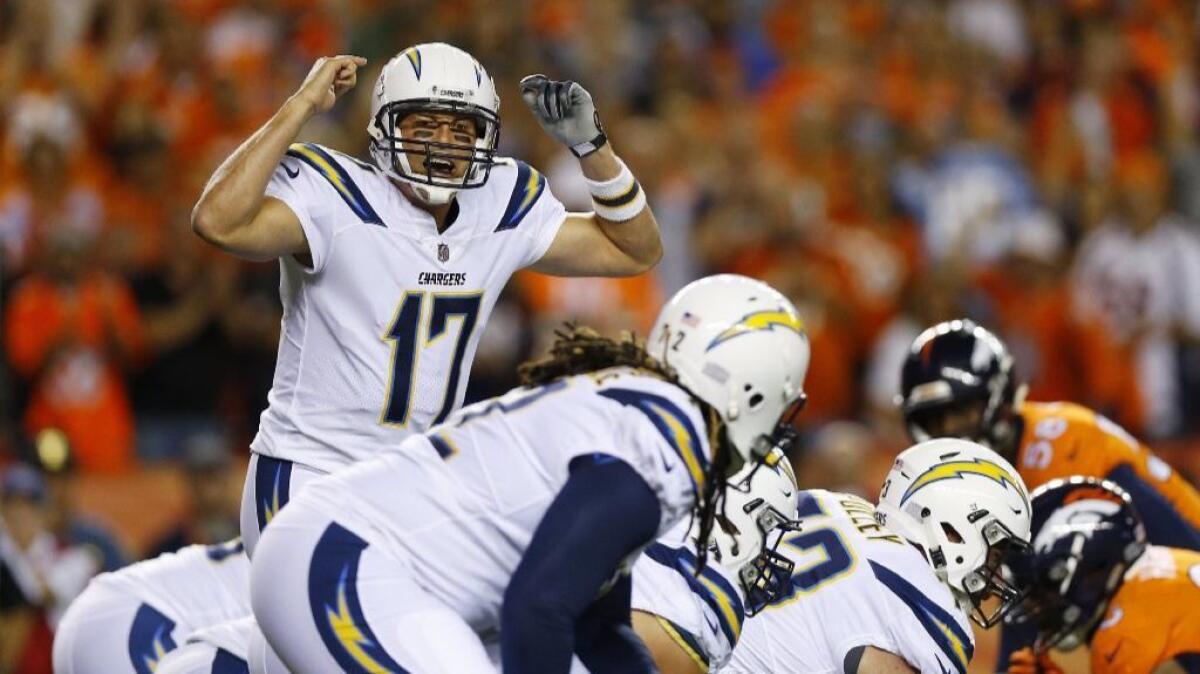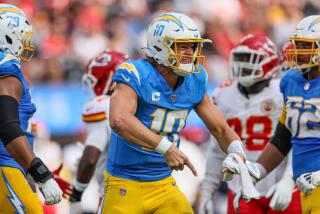Chargers crowd at StubHub Center won’t be able to speak volumes as Dolphins come to town

The Chargers lost their season opener against the Broncos, but have a chance for a win against the Dolphins in their first official game at the StubHub Center. Chargers beat writer Dan Woike and reporter Annie Heilbrunn discuss the top storylines le
- Share via
Chargers quarterback Philip Rivers stood behind the podium in the guts of Sports Authority Field in Denver, a mile above sea level, unshowered, eye black still painted on his face and barefoot.
He’d just played a football game, one his team lost in the final seconds, but he couldn’t help but grin.
The atmosphere, the fans screaming on third down, the roar before kickoff ... it created an environment tailor-made for a competitor like Rivers. The noise rattled the glass windows around the stadium. It shook the floor.
It mattered.
“This is as loud as I can ever remember this place,” he said with a quick smile.
Noise from that many people, at least for the next three weeks, will have to stay a memory as the Chargers embark on a unique experiment in Los Angeles, playing in front of crowds of fewer than 30,000 at StubHub Center in Carson.
Energy should be at its peak Sunday when the Chargers reenter Los Angeles’ crowded market, hosting the Miami Dolphins. For fans who have never been inside StubHub Center for an NFL game, they’ll surely be stunned at the intimacy and superior sightlines.
It’ll be unlike anywhere else.
But Chargers players know it won’t be like Denver. They know it can’t be that kind of a home-field advantage — at least not in the short term.
If we start winning games, people will start coming and it’ll be loud.
— Chargers defensive end Joey Bosa

“If we start winning games, people will start coming and it’ll be loud,” defensive end Joey Bosa said.
In the meantime, opposing teams probably won’t have to deal with the issues deafening decibels can cause.
The noise in Denver on Monday helped slow the Chargers offense, forcing them to strain to make changes and adjustments to plays. Rivers had to pace back and forth between his linemen, shouting instructions while the play clock ticked away.
It wasn’t the Chargers’ only problem in their season-opening loss, but it was a problem.
“It’s disruptive,” running back Melvin Gordon admitted, adding, “It just hurts you.”
No one has tricked themselves into believing the atmosphere Sunday will be similar. Although StubHub Center has done things such as installing high-tech sheeting in an attempt to keep noise insulated, the realities are what they are — capacity is about 27,000. There’s no roof, and a quarter of the stadium is open, allowing noise to sneak out like air through a tire puncture.
“It’s built the way it’s built,” Mark Tamar, Chargers vice president of fan experience, said. “… We’re going to work with what we have.”
The Chargers created Tamar’s position and hired him to take on the challenge of trying to get 27,000 or so to sound like twice as many fans. Tamar is no stranger to hostile NFL environments, having played a large role in Seattle’s fan engagement.
“My job,” he said, “is to drive those fans into a frenzy.”
It’s disruptive. It just hurts you.
— Chargers running back Melvin Gordon

The plan, in the short term, includes pyrotechnics, cannon fire and scoreboard prompts. In the long term, it’s about education and grooming, training the people who walk into StubHub Center to be convinced that the cheering “matters,” Tamar said.
Chargers offensive coordinator Ken Whisenhunt said he was proud that his team committed only one false start in the season opener. That’s one of the most tangible ways to measure the impact of noise.
But, Whisenhunt said, every time the volume rises, it tests an offense to be precise in how they speak to one another.
“When you call a play, everyone has an assignment. And within those assignments, it adjusts based on the defense they’re playing and the techniques you’ve got to use,” Whisenhunt said. “Just like you and I are talking, right now, it’s easy. But when you throw that noise into it, all of a sudden you have to yell to get that communicated. You have to process it. Then, you have to get down in a stance and be able to see the ball snapped and then you have to face Von Miller.
“There are a lot of things in there that make it hard.”
And the Chargers have said they want that too but, realistically, offering that while having only a limited supply of spots for fans won’t be easy.
“First and foremost, we want to deliver an unparalleled game experience to our fans,” A.G. Spanos, the Chargers president of business operations said in a statement announcing Tamar’s hiring. “To that end, we also want StubHub Center to be a loud, intimidating environment — one that makes the game difficult for our opponents.”
That seems near impossible — unless the team is willing to get creative.
Chris Kyriakakis, an associate professor of electrical engineering at USC and an expert in audio engineering and acoustics, said it’s not just noise, per se, that can disrupt how a quarterback communicates with the other 10 men on the field.
“It’s hard to pin it on decibel level. It really depends on the frequency content,” Kyriakakis said. “You know when you’re taking a shower or washing the dishes and you can’t hear? Those aren’t very loud, but because they cover a lot of frequencies, they cover the bins in your ear …
“Literally, if [fans] all started calling out instructions — just voices instead of chants — and it was 25,000 of them speaking, I think that would have a much better effect of screwing up the communications than just noise.”
Tamar and the Chargers know this process will require plenty of experimentation, finding out what keeps fans off phones and into the game, what gets them to their seats at kickoff instead of midway through the first quarter ... what sparks a passion for a team playing in L.A. for the first time in 47 years.
And the players on the receiving end of the cheers? They want to know too.
“Man, you know what? I just want to see the turnout first. I don’t know what it’s going to be,” Gordon said. “Hopefully, they cause havoc. That’s the plan. Hopefully they follow through with that because we’re going to need all the help we can get.”
Follow Dan Woike on Twitter @DanWoikeSports
More to Read
Go beyond the scoreboard
Get the latest on L.A.'s teams in the daily Sports Report newsletter.
You may occasionally receive promotional content from the Los Angeles Times.







